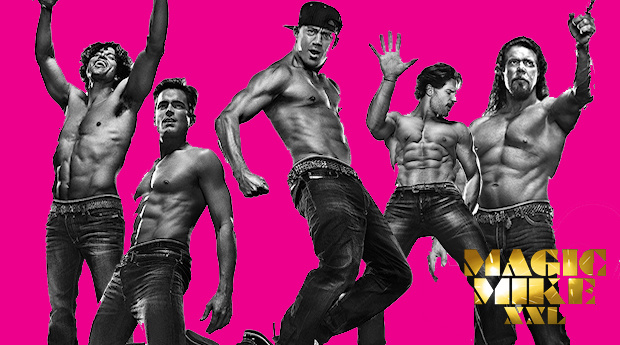On one hand, it makes no sense that Magic Mike XXL was written, directed, and produced by men.
On the other hand, it makes complete sense.
Let me back up: this movie is meant as pure, unadulterated eye candy. At least, that’s how it comes across. Two hours of giving the women what they want. Tatum Channing gyrating with his carpentry tools, enjoying himself way too much? Yep. Joe Manganiello stripping to “I Want It That Way” and dousing himself with water? Yes please. A dance segment involving both a faux-wedding AND a sex swing? Naturally.
What’s shocking about Magic Mike XXL isn’t the male strippers and gratuitous toned, oiled, tanned flesh on display. What’s shocking is that everyone looks like they’re having so much fun, in what we would usually think of as a world inhabited by the down-and-out. Adult entertainment isn’t supposed to be glamorous—at least, not for the those who perform within it. (In most movies, female strippers move sinuously in cages at sleazy clubs while wealthy men of the world conduct their business, ignorant of the bodies in their midst. See: Oceans 11.) And yet: in this Magic Mike XXL parallel universe, the entertainers seem to be having just as much fun—if not more—than the entertained. Jada Pinkett Smith preens in her power, calling the women who flock to the club she owns “queens”, giving them the visually and experientially rich nights out they crave. Donald Glover seems in awe of his own ability to make women happy, just by being there to listen and to perform for them. Matt Bomer sees himself as a healer—by sharing his talents. Joe Manganiello is damn proud to call himself a male entertainer; it’s his profession! There’s none of the gritty dark side to the adult entertainment business here. Sure, the guys are on a last-ditch road trip, facing the end of their careers (and their age of appeal). They’re uncertain about how they’ll make it in a post-stripping era. But they leave that angst behind to embrace the fact that their present hedonism is beautifully harmless. This is a sugar-coated approach to the sex industry. It’s all frosting. And as pure entertainment, it’s gloriously sweet.
So what’s wrong with that? I’ll be the first to say that I left the theater elated, giggly, and feeling pretty #blessed that people like Tatum and Manganiello exist to exhibit their bodies for our ogling. Did I love this movie? Yes. Should everyone go see it? Absolutely. I felt similarly after seeing the Entourage movie, but Magic Mike XXL left a better taste in my mouth—because I can’t defend Entourage as a feminist film (it’s disgraceful on that count, although good fun to watch), whereas popular discourse accepts Magic Mike XXL as a feminist’s dream.
But hold on. First off, this is a unicorn of a movie. As far as I’m aware, it’s the only wide-release film—at least amongst the non-pornographic kind—that exist for this kind of open female pleasure and complicit male objectification. Its singularity feels wrong, but it’s also expected. And yet: flip the genders, and the unicorn nature is still intact. Are there any sex-positive male-audience-oriented movies in which, despite heavy female objectification, the women maintain considerable agency?
The equivalent might be something like Coyote Ugly. But that one tallies more closely with the original Magic Mike, which was moodier and slower and filmed entirely (and annoyingly) in the Valencia filter. Coyote Ugly isn’t exactly sex-positive, though, despite the scantily clad dance routines. Of course, a movie about empowered female strippers who proudly claim they love being entertainers sounds ridiculous. Critics and (hopefully) audiences would disdain the positive angle. We would want grit and truth. We would dare a filmmaker to ignore the dangerous realities that plague adult entertainment, and we’d sign petitions to boycott his works for their damagingly unrealistic approach to a serious issue.
So should we be uncomfortable with the double standard we apply to Magic Mike XXL? Is male objectification inherently more palatable because it’s more rare? Or is male objectification just more palatable because the men never really seem all that negatively objectified?
That’s why, despite it’s pro-female-sexuality stance, despite the way it panders to women’s desires in a way that no other movie has ever done quite so explicitly (which is a good thing!), it’s still obvious that this was a movie constructed by men. (Add in the strict heteronormativity and elevation of machismo, and it becomes even clearer.) Straight men still have the power here—women, too, but the men are not subjugated by a gaze or a structure. They’re liberated by it, buoyant with it. This fact doesn’t make the movie any less enjoyable. It doesn’t make it any less of a celebration of the male figure (as art, as object, as athlete, as sex machine) and of the women who take pleasure in seeing and touching it. It simply begs the question: can we ever truly subvert machismo in sexuality—or is that a gender binary that will persist?
And, even more unsettling: can we even imagine a world in which (heterosexual) men do not revel in their own (heteronormative) physicality? And isn’t that pleasure-in-self—that supreme male confidence—a source of biological attraction for (heteronormative) women? In other words: is the ideal of sexual equality an oxymoron?
In 2015, we’re working hard to level the playing fields of class, race, and sexuality. We’re winning small victories consistently. People are calling out Magic Mike XXL as one of those small victories: the recognition that heterosexual women are an audience worth creating for, and their desires worth catering to. I celebrate this step forward unequivocally, just like I celebrate Charlize Theron’s turn in Mad Max: Fury Road; Alicia Vikander’s performance in Ex-Machina; the Marvel universe’s development of Ms. Marvel; Amy Schumer’s unapologetic Trainwreck. These things are fun to watch, and this is a fun time to be alive to watch it all unfold.
But leveling the playing field, for all its positive connotations, should not and cannot be the goal. Just like “leaning in” is important, but doesn’t ultimately change the game—it asks women to play nice with the boys. Just like female action stars are just men with breasts. The real heroes of Mad Max: Fury Road are the harem of sex slaves who retain their femininity in a masculine world. The real change happens when we shift structures, not just behaviors. And the structures of power that define fields of sexuality are especially fraught. Rightfully so, too. They are not things we level; they are things we shape, and re-shape, and mold to fit identities and specific relationships. Which is for the best: in sex, balance—true equality—is boring.
Magic Mike XXL succeeds as a Hollywood movie because it doesn’t subvert any power structure. It is not uncomfortable. It is not a threat to the current order. It is sugar—addictive, a kind of drug, and all the more delicious because women are having fun in it, too. But when we come off the high, let’s not forget that it feels so good because it’s not asking us to participate in a revolution. It’s not asking us to eat our greens. It’s smirking at us, with Channing Tatum’s irresistible charm, to enjoy the status quo. To let him guide and fulfill our sexual fantasies. To be his complicit object. To drink his sweet, sweet Kool-Aid.
So enjoy. Just don’t overindulge.


